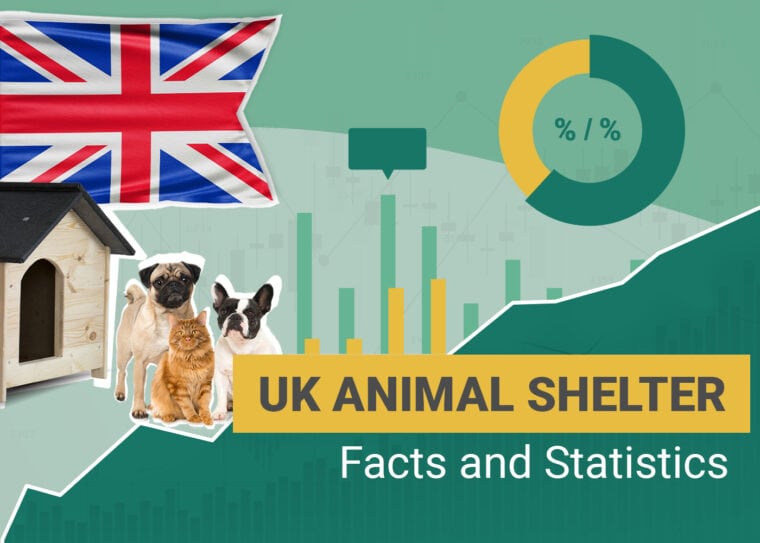
Click to Skip Ahead
Note: This article’s statistics come from third-party sources and do not represent the opinions of this website.
With 23 million pet cats and dogs, the UK is clearly a nation of animal lovers. But, like any country, the UK does have a lot of animals in shelters as well as those living on the streets as strays and homeless animals.
Although there is no full register of animal shelters, let alone the number of animals that are in rescues, it is estimated that there are more than 1,000 rescues and shelters that deal with more than a quarter of a million stray animals every year. The majority of the animals that end up in shelters are dogs and cats, although several thousand horses also find their way into homeless shelters.
And, while the number of pets being abandoned has risen sharply in the past few years, the number of owners adopting from shelters has fallen, which means that those 1,000 rescues are facing a substantial problem as they have more animals than they can reasonably help.
Below are 16 statistics related to animal shelters and animal homelessness in the UK.
Top 16 UK Animal Shelter Statistics & Facts
- There are 12 million pet dogs and 11 million pet cats in the UK.
- Only 20% of owners get their pets from shelters and rescues.
- Nearly half of pet owners have had to cut back on how much they spend on their pets.
- Nearly 10% of owners have considered, or have had to rehome their pets.
- Approximately a quarter of a million animals end up in rescues every year.
- There are approximately 100,000 homeless dogs in the UK at any time.
- There are approximately a quarter of a million stray cats.
- 11% more animals are being abandoned in 2023 compared to the year before.
- More than 1,000 rescues and shelters operate in England alone.
- 34% fewer pets were rehomed in 2022 than in 2019.
- 90% of people claim behavioural problems turn them off adopting.
- 60% of people won’t adopt pets because of a perceived lack of animal history.
- 9 out of 10 people believe animal welfare needs addressing.
- 28% of people donate to animal welfare charities, making it the most popular cause.
- 9% of all money donated to charities in the UK goes to animal welfare charities.
- The average animal welfare donation is just over £20.
Pet Ownership Statistics
1. There are 12 million pet dogs and 11 million pet cats in the UK.
(UK Pet Food)
The UK has a total human population of 67 million people, who live in just over 28 million households. The country also has a population of 12 million dogs and 11 million cats, 1.5 million rabbits, 1.3 million indoor birds, 1 million guinea pigs, and more than 3 million other pets. This equates to approximately 30 million total pets, or more than 1 per household, on average, and one pet for every 2 people.
And that figure excludes fish; there are 7 million indoor fish tanks and 6 million outdoor fish ponds.

2. Only 20% of owners get their pets from shelters and rescues.
(Statista)
There are various sources that people can get pets from. Pet shops have a supply of some animals, although typically smaller pets rather than dogs and cats. Lucy’s Law, which came into force in 2020, made it illegal to sell puppies and kittens in pet shops. Most often, owners buy their dogs from breeders, with a third of dog owners claiming this is where their pet came from.
25% bought from a private seller, and 22% got their pet from other sources, which may include online ads or from friends and family. Just 20% got their dog from a rescue or shelter.
3. Nearly half of pet owners have had to cut back on how much they spend on their pets.
(Tesco Bank)
A cost of living crisis has been fuelled by the Covid pandemic and worsened as a result of the conflict in Ukraine which has pushed up food and oil prices. This cost of living crisis has changed the way pet owners care for their pets, specifically regarding the amount of disposable income owners have to spend on their pets.
According to a survey by Tesco Bank, nearly half of all pet owners said that they have had to cut back on how much they spend on their pets.

4. Nearly 10% of owners have considered, or have had to rehome their pets.
(Tesco Bank)
The cost of living crisis is one of the reasons that UK shelters have seen an influx of surrendered pets. Many people who bought or adopted pets during the Covid pandemic, when they had a lot more spare time at home, have now returned to work. This has led to those owners no longer being able to provide the level of care the pet needs which has further fuelled an increase in abandonment rates.
According to the Tesco Bank survey, nearly one in ten owners have said that they have considered or have actually rehomed their pets.
Rescues and Strays
5. Approximately a quarter of a million animals end up in rescues every year.
(Hansard)
Not all rescues are registered. Many pets are also abandoned on the streets or in other locations and do not necessarily end up in shelters. As such, it is impossible to know the exact number of animals that do get rehomed by their owners, but estimates suggest that the figure is somewhere close to a quarter of a million pets. This includes cats, dogs, horses, and a variety of other pet animal species.

6. There are approximately 100,000 homeless dogs in the UK at any time.
(PETA)
All types of pets, including small caged pets, are rehomed by their owners for various reasons. However, dogs take up the most resources in shelters so they are the species that we most often consider when looking at stray and rescue animals. It is believed that there are around 100,000 homeless dogs in the UK at any given time.
While many of these will be in shelters, their future is incredibly uncertain, and many are abandoned elsewhere by people who don’t want to take them to shelters, too.
7. There are approximately a quarter of a million stray cats.
(The Guardian)
Stray cats are those that live on the streets, having previously lived in a home. They differ from feral cats, which are cats that are considered to have never lived in a home. In total, there are approximately a quarter of a million cats that are either stray or feral. They live in cities and towns but can also live on or near farms and other urban areas.
Many are not spayed or neutered, which means that the homeless cat problem only gets worse every year.

8. 11% more animals are being abandoned in 2023 compared to the year before.
(RSPCA 1)
The Covid pandemic led to many people getting their first pets. People were furloughed, worked from home, or couldn’t go out to work, and pets were seen as an escape, a form of company, and even a means of getting physical exercise during the difficult years. However, since the pandemic, most people have returned to their normal lives.
This means owners have gone back to work and are unable to provide the kind of pet care they did initially. As a result, abandonment rates in 2023 are 11% higher than they were in 2022, and these rates are much higher than they were in 2019.
9. More than 1,000 rescues and shelters operate in England alone.
(Hansard)
Rescues and shelters operate across the UK, including those run by organisations like the RSPCA and Blue Cross, as well as many independent centres. They have the impossible task of taking on, caring for, and hopefully rehoming all the animals they receive in their care. There are believed to be roughly 1,000 or more rescue centres and shelters in England alone, which means there are likely hundreds more in Scotland, Wales, Northern Ireland, and the rest of the UK.

Adoption
10. 34% fewer pets were rehomed in 2022 than in 2019.
(RSPCA 2)
The pandemic did have a catastrophic effect on pet ownership and abandonment rates, even though adoption numbers initially rose following the first lockdown as people were looking for new pets to enrich their daily lives. Since lockdowns stopped, rehoming rates have dropped significantly and, in 2022 there were 34% fewer adoptions than were seen in 2019.
11. 90% of people claim behavioural problems turn them off adopting.
(RSPCA 2)
When it comes to the reasons that prospective owners choose not to adopt, one of the most common reasons cited is the misconception that abandoned dogs always have behavioural problems and that it is easier to train a puppy from a young age. Not all dogs are abandoned because they are badly behaved, and with training and a loving environment, most dogs can be positively trained.
On the other hand, taking in a young puppy means that you will have to deal with litter training and early behavioural training as well as many other potential issues. 9 in 10 people still gave this as the reason they haven’t adopted a pet.

12. 60% of people won’t adopt pets because of a perceived lack of animal history.
(RSPCA 2)
60% of prospective owners also said that a lack of history for the animal put them off adopting. While it might be true that some dogs and cats come with no history from their previous owners, rescue centres should have a good idea of whether the animal is friendly, whether it has any obvious behavioural problems, and even whether it gets on with other dogs and even cats.
If you have specific requirements, go to your local adoption centre and let them know. They will try and help find the ideal pet for your needs.
Animal Welfare
13. 9 out of 10 people believe animal welfare needs addressing.
(RSPCA 1)
With hundreds of thousands of pets heading to shelters every year, animal welfare is an issue that many people in the UK believe to be an important one. When asked, 90% of survey respondents said that they believed it needed to be addressed by the government to help ensure better welfare for all pets.

14. 28% of people donate to animal welfare charities, making it the most popular cause.
(CAF)
More than a quarter of people in the UK donate to animal charities each year, which means more people donate to animal welfare causes than those that donate to causes for young children, foreign aid, or any other cause. Despite this, most animal charities are still desperately short of funding and need more money to help protect the animals in their care.
15. 9% of all money donated to charities in the UK goes to animal welfare charities.
(CAF)
Nearly one-tenth of all the money that is donated to charities in the UK goes to animal charities. The funding is vital to these charities because many struggle to get funding from the government and rely primarily on the money they raise from donations.

16. The average animal welfare donation is just over £20.
(CAF)
Although the total number of people donating to animal charities has dropped in the past few years, presumably as the cost of living crisis has worsened, the average amount that each donor gives has increased. Now, the average donation is just over £20.50. 15 million people donated to animal charities last year.
Frequently Asked Questions About Animal Shelters In the UK
Is it legal to sell dogs and cats in pet shops?
Although it is legal for third parties to sell adult cats and dogs, most pet store chains and many independent shops do not sell cats and dogs. And it has been made illegal for shops to sell young puppies and kittens. This was part of the legislation commonly known as Lucy’s Law.
What is Lucy’s Law?
Lucy’s Law came into effect in April 2020 and was aimed at reducing the suffering of dogs and cats that were bred in puppy farms and kitten mills. Any commercial entity selling puppies and kittens needs to be licensed and there were various aspects designed to reduce the suffering of young animals.
For example, puppies should be shown interacting with and living with their mothers, thereby reducing the risk of overbreeding and the act of leaving puppies without interaction from their mothers. (UK Government)

How much does it cost to adopt a pet from a shelter?
The cost of adopting a dog or cat varies from shelter to shelter, but it is usually cheaper than buying from a breeder. The fee covers the cost of caring for the animal and helps ensure that the rescue centre can continue to provide its service to other animals. It costs between £150 and £250 to adopt a dog from a centre, and between £100 and £200 for a cat. (Napo)
What is a no-kill shelter?
When shelters get overpopulated, some will euthanize the animals that have been with them the longest. They may also euthanize those animals that have been shown to have behavioural problems. However, some shelters refuse to euthanize animals for these reasons and will only do so due to ill health and on the recommendation of a vet. These are referred to as no-kill shelters.
Conclusion
The UK is a nation of pet lovers. Dogs are the most popular, closely followed by cats, but owners also keep an array of other animals including horses, lizards, fish, birds, and caged animals. Unfortunately, and through no fault of the animals, hundreds of thousands of unwanted pets find themselves in rescues and shelters every year. While many are fortunate enough to find a new, loving home, there is still an alarming number that will never be adopted.






